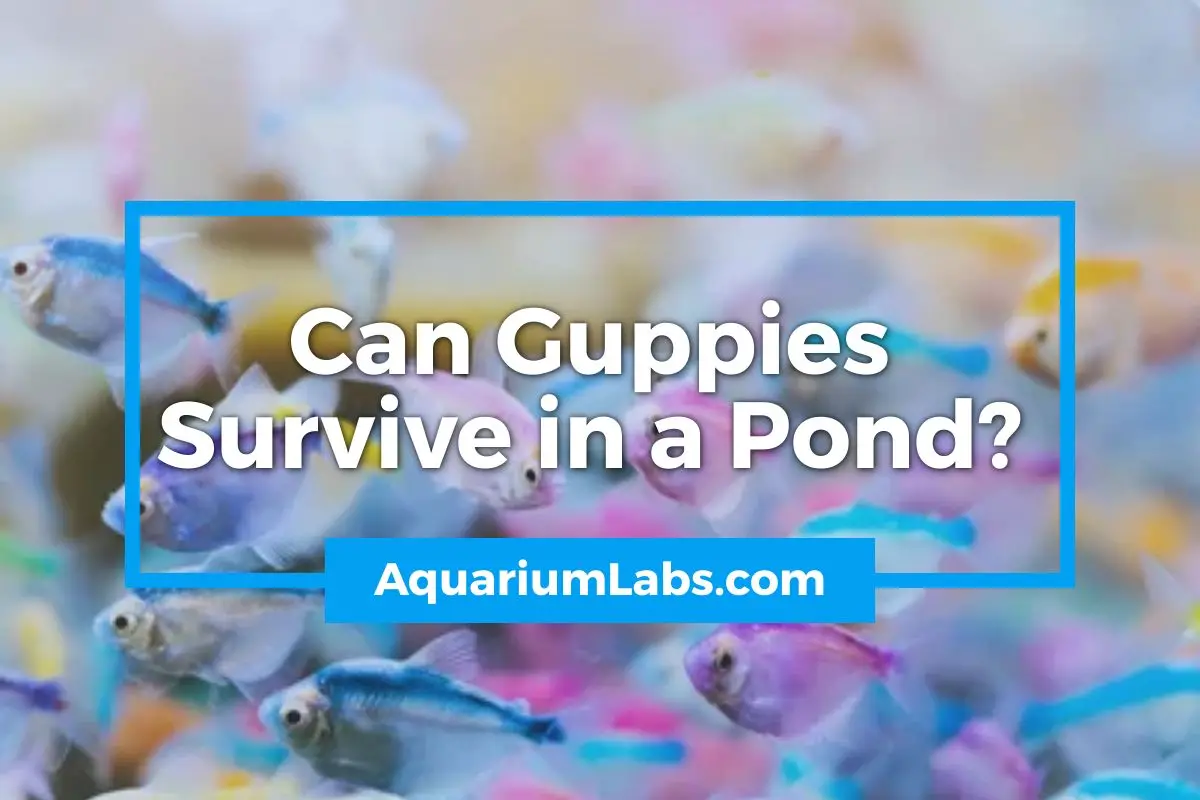Are you curiously asking yourself can guppies survive in a pond?
This article will review all you need to know about this hardy fish and if an outdoor pond is an ideal place to keep them.
Yes, you can keep your guppies in an outdoor pond if you keep them in the right water conditions. Guppies prefer warm water and can live in an outdoor pond with adequate water temperature.
Guppies are naturally small fish suitable for small ponds, and you may even keep them in containers placed outside, also referred to as patio ponds. Guppies prefer warmer climates; you should note this if you decide to go with an outside guppy pond.
They will thrive in climates where the temperature rarely falls lower than 67 degrees. If you live in a cooler climate, you should be ready to bring your guppies indoors during winter.
Overview of Guppy Tropical Fish Kept in a Guppy Pond
Guppies are minuscule, energetic tropical freshwater fish measuring about 1.5” long. They come in many varieties and feature multiple colors, which are a beauty to behold.
Due to their small size, you can easily keep them in small tanks containing 9 or more guppies. They are docile and cohabit well with other fish in the community tank, but make sure not to keep them in the same tank with fish eaters!
Guppies are more inclined to warm water conditions with a 70-to-80-degree heat level. A calm current is also preferred for your guppies due to their small size and fragile body.
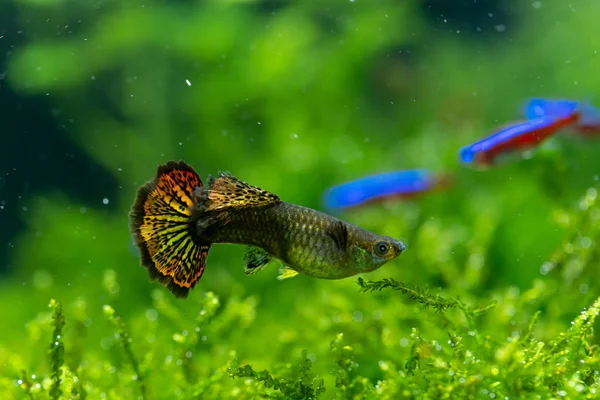
When keeping guppies in a pond or aquarium, ensure you don’t set your filtration system to produce a strong water current. You are better off adopting a sponge filter for your aquarium tank for these fish species.
Guppies reproduce by giving birth to live fry. They do not require much encouragement. However, guppies are omnivores and might eat their young ones in a crowded tank.
Therefore you must try to remove the excessive fish from the pond/tank before it becomes an uncontrollable issue; otherwise, make sure you keep them in a large-sized pond that will allow them to thrive. A large-sized aquarium helps create the perfect area for the young guppies to grow, as they can swim out of sight of the adult fish while they are attaining adulthood.
Guppies are social fish, but if there is an imbalance in the male-to-female ratio, they can begin to stake their territory, and the males might pick on one another.
You are better off with a three-male-to-four female ratio to keep peace in your pond or tank. Do not hesitate to take out the additional male and keep it in its own tank to maintain sanctity.
There are many guppy varieties, and your selection is really just a matter of preference. All guppies require equal amounts of care and feeding. Guppies with fancy colors are the most popular since they fill your tank with a beautiful rainbow of hues. Veiltails feature beautiful enormous fins that catch the eye.
Another popular option among guppy keepers is the Swordtail, a popular guppy species with a sword-like tail. Third on the list is the less flashy Endler’s guppy.
When you intend to keep your guppies in a pond, you need to take special consideration of their colors and ensure that you do not keep flashy guppies in areas they would be visible to predators.
Basics for Your Guppy in an Outdoor Pond
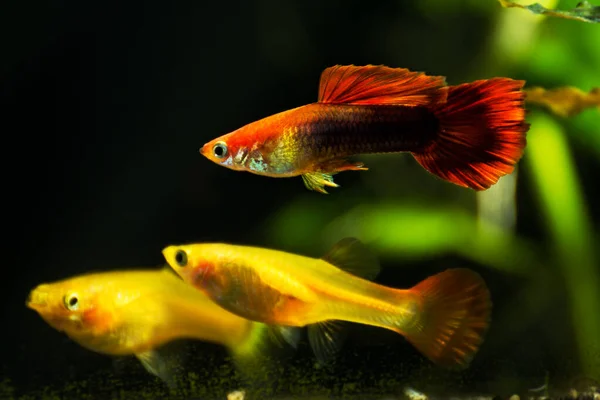
Guppies are one of the smallest fish you will keep in your pond or tank; therefore, their space requirement is minimal. Whether you are keeping a large pond or a small container pond, even a tank of about 10-12 gallons is a lot of space for guppies. You should especially note the filtration system when preparing a pond for your guppies. Guppies enjoy slow and calm currents due to their delicate fins.
With a pump and filter in your pond, your guppies will be truly happy and clean. You might also equip your guppy pond with a heater and air pump if you reside in an area with fluctuating temperatures.
Like most fish, guppies prefer a balanced temperature, and since they are warm water fish, it is important that they are provided with a heating system that will protect them from getting chilly.
You can achieve aeration in your pond by equipping it with a system that features a fountain. It would be best if you took care to provide the tiny guppies with enough room to navigate, as the waterfall might create currents that could sweep them up.
Having live plants in your pond is almost a necessity; its function transcends merely providing atmosphere. The presence of these aquatic plants in your water helps you cleanse your tank of waste and allows for proper oxygenation for your guppies.
The symbiotic relationship between your plant and the water helps make your pond water maintenance easier. The foliage of the pond also helps provide adequate coverage that allows your guppies to hide as it grows, which will help relieve their stress.
Guppies are water-sensitive, and the flow of water is a determining factor when considering the overall well-being of your fish. Therefore it is in the best interest of your fish that you provide aquatic plants to promote oxygenation in the tank.
To help your guppies breed and grow strong, you should endeavor to situate the pond near partial sunlight. Partial sunlight is needed, as a direct onslaught from the full sun could make the water super hot if not checked.
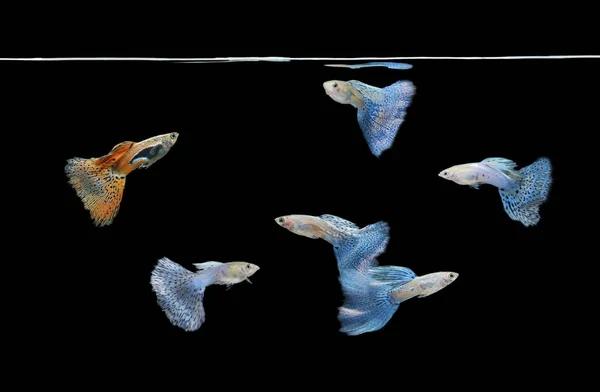
Check the location of your pond and make sure it’s situated in a place that gets enough sun. You should endeavor to provide adequate coverage, in the form of plantings or commercial coverings, for your guppies.
Guppies need small, delicate plants that will provide them with proper coverage. It will also help keep your aquarium free of unwanted pests and promote the general health of your fish, as your guppies will likely consume mosquito larvae and algae.
Guppies will survive in an outdoor pond that mimics their natural habitat, as long as the water temperature is right and the pond allows for ample swimming space. The right temperature for guppies is warmer temperatures.
Fancy guppies eat live food and mosquito larvae when kept in an outside pond. Whether they are placed in a small pond or not, female and male guppies will breed guppies just like when they are placed in an indoor aquarium, and your guppy fry will survive like other fish outdoors.
Factors You Must Consider When Raising Your Guppies
Like any other fish, your guppies face unique dangers from living in the pond that you will need to consider. Guppies like to jump around in the pond; hence you should try to keep your guppies in an outside pond with a net covering.
Aside from keeping your guppies from jumping out of the pond, it also helps protect them from falling prey to predators attracted to them by their bright colors, looking for an easy meal. It also helps keep debris from littering your pond.
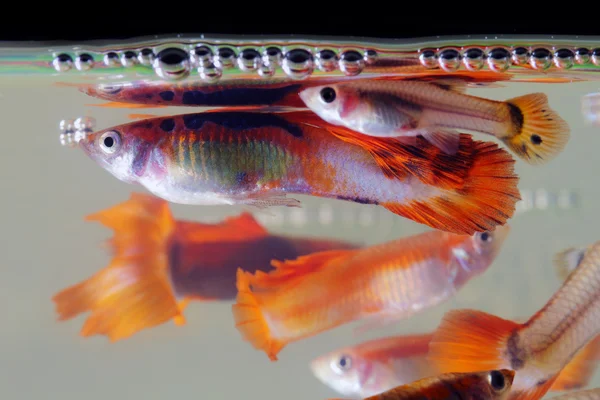
It helps limit the littering of leaves and other unwanted waste in your garden, which could create a situation of wrong chemical composition in your pond and lead to the growth of algae. It also helps limit filter clogging and increases the filter’s effectiveness.
Guppies are live-bearing fish and will likely litter your tank with their fry if the population is not kept in check.
Be careful when placing them in ponds with other fishes, as they will likely stifle the pond with their population and make it difficult for other tropical fish to get food.
If you are to raise guppies in an outdoor pond, endeavor to keep larger fish as tank mates or in a climate where winter chills can prevent them from taking over like weeds.
How Long Can You Keep Guppies Outdoors?
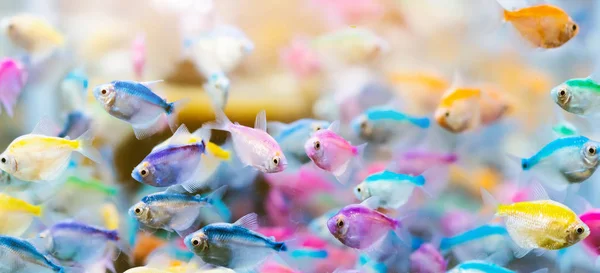
Depending on the pond’s water temperature, your guppies can be kept outdoors for as long as you like. Guppies can withstand temperatures as low as 20 degrees Celsius (68 degrees Fahrenheit), and if your temperature does not fall below this, you can keep guppies out for the entire year.
Warmer temperatures are experienced between April and October. If the Autumn season is cool, you can move them inside to a fish tank with warm water.
Generally, guppies thrive in outdoor ponds during spring and summer. You can then move them during the turn of the season when the temperature falls, i.e., during autumn and winter.
Final Thoughts
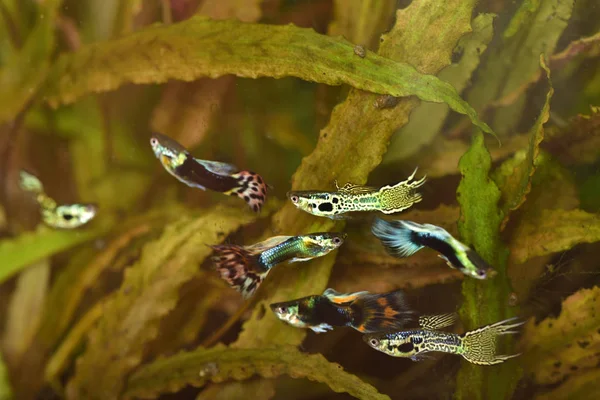
Most beginners and experienced fishkeepers prefer guppies due to multiple factors. This lovely fish has many varieties, and you can keep lots of them so that the beautiful colors can create a rainbow pleasant to the eyes.
They like warm water and excel in tropical climates, and their smallish size makes them comfortable in even small ponds or containers placed on patios or ample space. Guppies are tropical fish with sensitive fins. They require only minimal current and might get swept up if placed in a tank with a heavy flow.
When you care well for your guppies, they will survive for an extended period. Guppies birth their fry alive and, unlike other fish, do not lay eggs. They breed fast and easy, so it is vital to make sure that your pond is large enough to accommodate extra fish.
Guppies are excellent pond fish, and apart from being low maintenance and beautiful, they also enjoy eating live food. You can feed your guppy mosquito larvae and other live food as part of its meal.
Netting your pond is also essential to protect the guppies from escaping the pond and to protect them from possible predators. Be careful when keeping guppies in outdoor ponds in climates that support guppies, as they breed arbitrarily and might overrun your tank if you are not careful, causing discomfort to other fish in the pond.
Overall, guppies can live comfortably in an outdoor pond, as they require little maintenance, meaning it is easy for them to thrive and adapt in the right outdoor ponds.
Related Reading:

